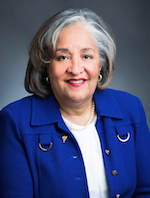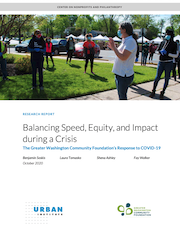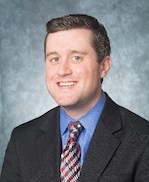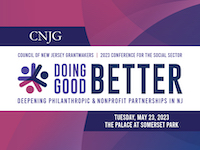Site Search
- resource provided by the Forum Network Knowledgebase.
Search Tip: Search with " " to find exact matches.
To answer the basic question of how many active family foundations are planning to spend down or exist in perpetuity (or have not yet made a decision), and to examine foundations’ motivations and decision-making, the Foundation Center, in collaboration with the Council on Foundations and with additional assistance from the Association of Small Foundations, launched a study of family foundations in 2008. This report presents the full range of study findings, which are based on survey responses from 1,074 family foundations.
 New Jersey’s largest philanthropic association has named longtime social sector leader Maria Vizcarrondo as its president.
New Jersey’s largest philanthropic association has named longtime social sector leader Maria Vizcarrondo as its president.
“Maria has been a trailblazer throughout her career,” said Council of New Jersey Grantmakers Board Chair William V. Engel. “We turn to her to help the state’s diverse and dedicated philanthropies to be even more effective in their quest to make this a better place.”
The Council of New Jersey Grantmakers is a nonprofit organization of over 130 members representing the philanthropic community in the state. Members include family, private, community, independent and corporate foundations, and corporate giving programs.
The Council exists to strengthen and promote effective philanthropy throughout New Jersey. CNJG’s programs and resources increase the impact of organized philanthropy’s support for adequate health care, quality education, a cleaner environment, community development, historical preservation, disaster response and relief, research, recreation, culture, and other areas crucial to the fabric of New Jersey's communities.
“I am very excited about joining the Council of New Jersey Grantmakers as its CEO and working with dynamic individuals — many of whom I have known and respected throughout my nonprofit career,” Ms. Vizcarrondo said. “Most importantly, I look forward to forging partnerships that will advance the Council’s social impact as a sector leader in New Jersey communities, the region, and nation.”
Ms. Vizcarrondo, who spent most of her career in northern New Jersey, comes to the Council from Cabrini University in Philadelphia, where she most recently was Director of Community Development and External Relations. She was inaugural Executive Director of the school’s Nerney Leadership Institute, launched in 2013.
Ms. Vizcarrondo brings more than 25 years of experience transforming service organizations and has served her communities as both an appointed and elected official.
In 2006, when he was first elected Mayor of Newark Cory Booker tapped Ms. Vizcarrondo to head Newark’s Health and Human Service Department, the largest of its kind in New Jersey. One of her first actions in that role was to develop a Children’s Bill of Rights to benchmark improvements in the lives of children and families throughout the city. Her accomplishments included securing state funding to establish Family Success Centers to provide neighborhood- based services, and launching a major citywide campaign to raise the immunization rates of Newark’s children.
Prior to her mayoral appointment, Ms. Vizcarrondo served as the first woman president and CEO of United Way of Essex and West Hudson. Her pioneer work in re-engineering the organization’s mission into community building was documented in the United Way Transformation Diaries. In the aftermath of the 9/11 attacks, Ms. Vizcarrondo led the New Jersey United Ways in a statewide coordination of services for affected families and managed the distribution of corporate funding for these efforts.
She was elected Essex County Surrogate in 1993 and served four years of a five-year term before leaving to join United Way.
Ms. Vizcarrondo has been listed among the “100 Most Influential People in New Jersey” and was a founding member of the New Jersey Institute for Social Justice.
###
Novartis benchmarked Employee Crisis Programs, and asked fellow corporate funders via the corporate funders listserve to answer the questions below.
- If you have an Employee Crisis Program, what is the name
- Do you manage the program internally or thru a 3rd party? If you use a 3rd party, can you share their name/website and any good/bad experiences.
- Do you only support disasters or other hardships as well?
- What is the average percentage of your employees that apply for aid?
- What is your minimum and maximum funding?
- What is the average amount of aid?
- Do you provide aid directly to the employee and/or vendors?
- Do you allow employees to donate to your fund? If so, how do you promote awareness and what is the employee donation participation rate? Do you match these donations?
- Where does the program reside (CSR, Foundation, HR)?
- Please share guidelines and applications, if possible.
- Please share any other insights.
The Ford Institute for Community Building, a program of The Ford Family Foundation, works to help community leaders learn how to implement local solutions based on principles of effective community building. This paper describes the development and work of the The Ford Institute for Community Building.

The COVID-19 public health and economic crisis has changed our world as we know it. As employers moved to remote work, schools shifted to distance learning, and businesses closed completely, it became clear that the impact on residents, nonprofits, and businesses was far greater than anyone could have ever imagined.
In response to the growing and evolving needs of our region, the Greater Washington Community Foundation established the COVID-19 Emergency Response Fund to raise and rapidly deploy funding to local nonprofits providing food, shelter, educational supports, and other critical services.
From the beginning our goal was clear: to address the immediate needs and reach adversely affected communities, particularly low-income households and communities of color. We know all too well that in a crisis like this, these marginalized communities are hit the hardest, and often take the longest to recover.
In times of crises, The Community Foundation is our region’s philanthropic first responder, bringing together individuals and families, philanthropic peers, corporate partners, and local government advisors to address community issues. Building on our rich history of emergency response work, we grounded our COVID-19 response efforts in a similar coordinated approach.
This report chronicles the steps taken, under immense pressure, to develop a coordinated emergency response effort to support a broad range of needs across the region. Once again this effort has demonstrated that working in partnership and close collaboration with our philanthropic peers and local government advisors is an effective way to manage a response to both urgent and longer-term needs.
A CNJG member queried the Health & Aging listserves asking for sample letters of inquiry. This document includes a few responses from fellow members. If you would like to add yours to this list, please email us.
Philanthropic organizations of all shapes and sizes are well positioned to support Communities for a Lifetime (CfaL). This issue brief explores four roles for philanthropy in advancing CfaL work.
The Council of New Jersey Grantmakers’ offers listserve services as a benefit of CNJG membership.
CNJG’s listserves facilitate ongoing group e-mail discussions among subscribed members. Members can share information and expertise, ask questions, and gather opinions of colleagues across the network. Listserves also enable members to get the most up-to-date information on related programs being offered throughout the field.
CNJG initially assigns new members to relevant listserves based on your submitted member profile. Contact Craig Weinrich to join any other listserve that interests you. You can unsubscribe from a listserve at any time by using the link found at the bottom of each email sent via the listserve.
In May 2024, our listserve provider updated its email engine, and now the automatic de-duping feature is no longer available, so sending an email to more than one listserve results in multiple emails to the recipient.
If you send an email to a listserve, and it bounces back to you, you are not on that listserve. Please contact Craig to add you to that listserve.
The listserves available are:
Camden Funders - [email protected]
Bergen Funders - [email protected]
Community Foundation CEO’s - [email protected]
CNJG Member CEO's - [email protected]
CNJG Member CFO’s and Finance Managers - [email protected]
CNJG Member Communications Staff - [email protected]
Corporate Funders - [email protected]
COVID-19 Funders - [email protected]
Culture Funders - [email protected]
Disaster Response Funders - [email protected]
Education Funders - [email protected]
Emerging Leaders in Philanthropy - [email protected]
Environmental Funders - [email protected]
Family Funders - [email protected]
Food Funders - [email protected]
Health Funders - [email protected]
Monmouth & Ocean Roundtable of Funders - [email protected]
Newark Funders - [email protected]
New Jersey Census Funders - [email protected]
Paterson Funders - [email protected]
Racial Equity Funders - [email protected]
STEAM Funders - [email protected]
South Jersey Funders - [email protected]
Strong & Thriving Communities - [email protected]
Trenton Area Funders - [email protected]
There are some restrictions for joining listserves:
· only CEOs (or equivalent) can join the CEO listserve;
· only CEOs (or equivalent) of a Community Foundation can join the Community Foundation CEO listserve;
· only CFOs (or equivalent) can join the Financial listserve
· only family foundation staff and trustees can join the Family Funders listserve;
· only corporate giving professionals can join the corporate listserve
Please refer to the Listserves’ Membership Policies below for information on using the listserves.
An overview on the self-dealing law, including definitions, common problem areas, exceptions, penalties, and resources.
Tax Exempt Organization Search helps users find information about a tax-exempt organization’s federal tax status and filings. You can find:
- Organizations eligible to receive tax-deductible charitable contributions (Pub 78 data).
- Automatically revoked organizations
- IRS determination letters dated on or after January 1, 2014
- Form 990-series returns
- Organizations that have filed a Form 990-N (e-Postcard)
Kevin Callaghan is Next Leader of Innovative Partnership
 The Council of New Jersey Grantmakers (CNJG) and the City of Newark are pleased to announce the appointment of Kevin Callaghan as the Council’s new Philanthropic Liaison to the City of Newark. Based in Newark’s City Hall, Callaghan will lead the Office of the Newark Philanthropic Liaison (ONPL) as it convenes, connects and leverages the resources of the state, regional and national philanthropic community for the benefit of Newark’s citizens and institutions. For nearly five years Callaghan served as the Program Officer at the Foundation for Newark’s Future, the local arm of national philanthropic funding donated to the City of Newark to improve education opportunities for youth. Most recently, he served as Project Lead on the City’s Summer Youth Employment Program. He will formally undertake his new role on September 1.
The Council of New Jersey Grantmakers (CNJG) and the City of Newark are pleased to announce the appointment of Kevin Callaghan as the Council’s new Philanthropic Liaison to the City of Newark. Based in Newark’s City Hall, Callaghan will lead the Office of the Newark Philanthropic Liaison (ONPL) as it convenes, connects and leverages the resources of the state, regional and national philanthropic community for the benefit of Newark’s citizens and institutions. For nearly five years Callaghan served as the Program Officer at the Foundation for Newark’s Future, the local arm of national philanthropic funding donated to the City of Newark to improve education opportunities for youth. Most recently, he served as Project Lead on the City’s Summer Youth Employment Program. He will formally undertake his new role on September 1.
Newark Mayor Ras Baraka and CNJG President Nina Stack hailed Callaghan’s appointment. “In the time I’ve come to know Kevin I’ve seen the passion he has for the City of Newark and the thoughtful, inclusive way he approaches his work,” commented Mayor Baraka. “We are glad to have him on our team.” CNJG President Stack added, “Kevin brings an understanding of how foundations work and a real appreciation for the impact strategic philanthropy can have when it works collaboratively with other funders and government leaders. We are very excited to welcome Kevin in this role as leader of the ONPL and look forward to seeing how he builds on the Liaison Office’s achievements over the last eight years.”
Callaghan replaces former Newark Philanthropic Liaison Jeremy Johnson who helped define this innovative collaboration between the Council and the City of Newark in 2007 under former Mayor, now United States Senator, Cory Booker. It marked one of the nation’s first formal partnerships between a city and the philanthropic sector. Since then, and with the subsequent election of Mayor Ras Baraka in 2014, the ONPL has continued to be a nationally acclaimed model for public - philanthropic alliances, leveraging more than $50 million in private support for City initiatives.
Callaghan will work in partnership with Mayor Baraka’s Chief Policy Advisor Tai Cooper and cabinet to support public safety, summer youth employment, workforce development, economic development, health and wellness, education and literacy, immigration, and neighborhood and place-based initiatives. “The Office of the Newark Philanthropic Liaison is a critical resource to our city. Having previously worked with Kevin, I know he will be very effective in his new role and I look forward to continued collaboration with him,” said Cooper.
“It is an honor to have been selected to lead the Office of the Newark Philanthropic Liaison. I know firsthand the value of collaboratively harnessing the power of philanthropic resources for the direct benefit of Newark’s communities. Under the guiding principle of collective action, I look forward to working with the grantmaking community and the City of Newark to leverage every possible opportunity to unlock the endless potential of this city,” said Callaghan.
A non-partisan position, the ONPL is funded by a consortium of grantmakers including Bank of America, the Geraldine R. Dodge Foundation, The Nicholson Foundation, The Prudential Foundation, Schumann Fund for New Jersey, Turrell Fund and the Victoria Foundation. “Having served with my colleagues as an on-going funder of this unique initiative, I am delighted to know that the fine work that has been accomplished since its inception will continue under the able leadership of Kevin Callaghan,” said Dr. Irene Cooper- Basch, Executive Officer of the Victoria Foundation.
Previously, Callaghan served for two years as a middle school classroom teacher in Philadelphia through Teach for America. Earlier in his career, he worked for the federal government as a special assistant at the Overseas Private Investment Corporation in Washington D.C. where he supported development efforts for emerging markets.
Callaghan holds a Bachelor’s Degree in Political Science and History from St. Peter’s University in Jersey City and a Masters’ Degree in Urban Education from the University of Pennsylvania. Born and raised in New Jersey, he resides with his family in Essex County.

Steering Committee
Jorge Cruz, Executive Director, LISC Greater Newark
Linda Czipo, President & CEO of the New Jersey Center of Nonprofits
Jackie Edwards, Executive Director, Parents Inc of NJ
Victoria Fernandez, Director of Thriving Communities, Grunin Foundation; and Co-Founder, Nonprofit Professionals of Color Collective
Tyneisha Gibbs, Founder and Principal Consultant of 144th & Vine; and Co-Founder, Nonprofit Professionals of Color Collective
Theresa Jacks, President and CEO, Council of New Jersey Grantmakers
Bridget Phifer, Chief Executive Officer, Parkside Business & Community in Partnership
Rosalía Velázquez, Director of Strategic Partnerships, New Jersey Center of Nonprofits
Advisory Group
Keith R. Adams, Executive Director, NJVOAD
Carin Berkowitz, Executive Director, New Jersey Council for the Humanities
Elsa Candelario, Professor of Professional Practice, Latino/a/x Initiatives for Service, Training, and Assessment, Rutgers School of Social Work
Jane Cohen, Executive Director, Governor’s Office of Climate Action and the Green Economy
René O. Deida, Director, Corporate and Community Engagement, Prudential Financial, Inc.
Hans Dekker, President, Community Foundation of New Jersey
Craig Drinkard, Co-Executive Officer, Victoria Foundation
Bill Engel President, The Union Foundation
Andy Fraizer Executive Director, Community Foundation of South Jersey
Laurie Goganzer, President and CEO, YMCA of Greater Monmouth County
Jeremy Grunin, President, Grunin Foundation
Bob Guarasci, Founder & CEO, New Jersey Community Development Corporation
Susan Hoskins, Executive Director, Friends Foundation for the Aging
Sharnita C. Johnson, Vice President of Strategy, Impact and Communication, Victoria Foundation
Elaine E. Katz, Sr. Vice President, Kessler Foundation
Eddie LaPorte, Director, New Jersey Office of Faith Based Initiatives
Taneshia Nash Laird, President and CEO, Newark Symphony Hall
Tammy Rice Herman, Director of Grants & Strategies, New Jersey State Council on the Arts
John Thurber, Partner, Br'Island Group
Keith Timko, Executive Director & CEO, Support Center
Sandra Toussaint, President & CEO, United Way of Greater Mercer County
Allison Tratner, Executive Director, New Jersey State Council on the Arts
Mark Valli, CEO, NORWESCAP
Margaret Waldock, Executive Director, Duke Farms
Catherine Wilson, President & CEO, United Way of Greater Newark
Doing Good Better, a partnership of the Council of New Jersey Grantmakers and the New Jersey Center for Nonprofits, is a community of funders and nonprofits taking action against the power imbalances and racial inequities in philanthropy, nonprofits, and government.

Date: Tuesday, May 23
Time: 8:00 a.m. to 4:00 p.m.
Location
The Palace at Somerset Park
333 Davidson Ave, Somerset, NJ
The Council of New Jersey Grantmakers is pleased to present our 2023 Conference for the Social Sector on May 23, 2023. The conference theme will focus on our initiative: Doing Good Better, a partnership between the Council of New Jersey Grantmakers and the New Jersey Center for Nonprofits. This long-term initiative aims to shift the culture of the New Jersey philanthropic and nonprofit ecosystem by encouraging funders, nonprofits, and government to create shared power rooted in collaboration, mutual trust, and respect.
The 2023 Spring Conference for the Social Sector: Doing Good Better will explore how funders and nonprofits can address philanthropy’s power imbalances, rethink traditional grantmaking practices to better serve New Jersey communities, and position equity as a driving force. For many years, but particularly in the context of the COVID-19 pandemic, natural disasters, and the heightened outcry for racial equity and social justice, funders have been urged to embrace more flexibility and transparency in their grantmaking. Practices such as general operating support, simplified application and reporting procedures, multi-year funding and others have been shown to level the power imbalance, advance greater equity, strengthen partnerships between funders and their nonprofit partners, and thereby improve community impact. The conference will present strategies and tools including trust-based philanthropy, participatory grantmaking, power redistribution, and others that we can all employ to inform and realign processes, systems, and culture in the social sector. Join foundation, philanthropic, government, and nonprofit colleagues to learn about and leverage these tools. Together, we will discover and strategize how we collectively can "do good better”.
| Agenda | |
| 8:00 - 9:00 am | Registration/Breakfast/Networking/Resource Marketplace |
| 9:00 10:00 am | Opening Plenary |
| 10:00 - 10:15 am | Networking & Resource Marketplace |
| 10:15 - 11:30 am | Breakout Sessions |
| 11:30 - 11:45 am | Networking & Resource Marketplace |
| 11:45 - 1:00 pm | Luncheon Plenary |
| 1:00 - 1:30 pm | Table Discussions |
| 1:30 - 1:45 pm | Networking & Resource Marketplace |
| 1:45 - 3:00 pm | Breakout Sessions |
| 3:00 - 4:00 pm | Ice Cream reception/Networking/Resource Marketplace |
A sample document detailing the core values of the Betty and Davis Fitzgerald Foundation including restrictions on participation on nonprofit/grantee boards.
